Information about previus and upcoming CONSPIRACY_FX events will be added to this page.
CONSPIRACY_FX Writing Retreat 2025
From 15-19 September, members of the CONSPIRACY_FX team came together with members of the University of Kent Political Psychology lab and PSY_POL project for the annual CONSPIRACY_FX Writing Retreat. The week provided dedicated time and space for collaboration, discussion and for work on emerging ideas and papers.
Set in the beautiful environment of Great Higham Barn, the retreat is always a time for creativity and team building and allows us to come together for productive discussions to drive the project forwards and strengthen our shared goal to better understand how people engage with conspiratorial narratives – and what the consequences of this are.
Thanks again to the team at Great Higham for the amazing venue, and for Pippa White for the lovely lunches, and thanks to everyone who came for making it such a productive week!
Guest Speaker
On Thursday 5th June we were pleased to host Dr Neophytos Georgiou, Lecturer in Psychology and Post-Doctoral Researcher at Flinders University in Australia, to Canterbury to deliver his talk titled ‘A ‘clinical applied’ approach to conspiracy theories: Working with vulnerable groups’. Since completing his PhD in 2023, Dr Georgiou’s research has focused on the cognitive and clinical mechanisms underlying misbeliefs in the digital age, particularly conspiracy theory endorsement. His work spans a range of applied contexts including autism, eating disorders, and behavioural addictions—such as gambling, substance use, and internet gaming disorder. Dr Georgiou’s current research explores how metacognition and cognitive inflexibility shape vulnerability to misinformation, with a growing focus on the unique challenges posed by social media and emerging technologies.
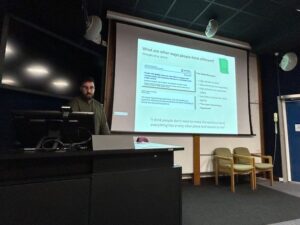
Abstract
This talk takes a clinical applied look at conspiracy theories and misinformation, with a focus on how we can practically address key questions in the field. Alongside sharing findings from my research, I’ll reflect on the process of building a research identity as an early career researcher—tracing how my work has evolved from early questions during the COVID-19 pandemic to a broader focus on vulnerability. In particular, I’ll discuss emerging evidence that certain cognitive and clinical profiles are more susceptible to conspiracy beliefs and misinformation. The talk will also consider why this matters—clinically, in research, and across the wider population—both in light of past events and in preparing for future challenges. I’ll end by outlining my current work, which explores how these issues intersect with online antisocial behaviour and early-stage radicalisation.
CONSPIRACY_FX Writing Retreat 2024
September saw the team return to the beautiful Kent Countryside for the annual CONSPIRACY_FX Writing Retreat. We were joined by the PSYPOL project and members of the PolPsych_Kent lab for four days of writing, reflection, discussions and team building.
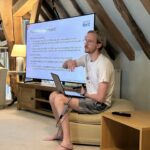


CONSPIRACY_FX Conference on the Consequences of Conspiracy Theories
On 28th and 29th June 2024, we were delighted to host our conference on the consequences of conspiracy theories. You can read more about the conference and see some pictures by following the link below.
Guest Speaker
On Thursday 9th May 2024, we were very happy to have a two-day visit from Professor Emma Thomas. Emma is Matthew Flinders Professor of Psychology at Flinders University, Australia. Her work sits at the nexus of social and political psychology and focusses on understanding when, why and how people commit to engaging in action to bring about greater justice and inclusion for disadvantaged groups in society – and, more recently, why some people act to oppose inclusion. Emma gave a talk entitled “‘Progress is the realisation of utopias’: When does imagining the future shape commitment to action in the present?”. Her abstract is below.
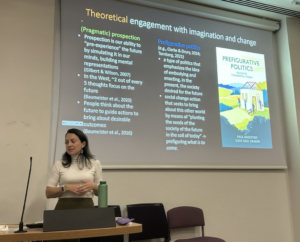
Abstract:
Social change is inherently temporal – how things were in the past, are in the present, could be in the future. Multiple theoretical statements acknowledge the importance of the human capacity to envisage an alternative to the status quo – variously conceptualised as cognitive alternatives, temporal comparisons, utopian thinking, or prospection. However, relatively little work empirically tests the effects of such imagined futures on commitment to collective action to bring about change. In this talk I will present a program of research that examines how discontinuous changes in the present shape how people’s thoughts and emotions, as well as intentions to act to bring about, the future. Experiments (total N > 900) revealed that whilst imagining a positive alternative future (relative to the present-day status quo) on issues like race relations, climate change and economic inequality can stimulate commitment to change, it does not uniformly do so. Rather, the effects of imagining an alternative to the status quo are conditioned on: counteracting emotional responses (i.e., utopian hopes offset dystopian fears); the content of that future (i.e., how positive, idealised, that future is relative to the present); and the anticipated outcomes of such a future (i.e., whether advantaged group members anticipate loss of status in attainment of future equality). We identify when progressive and conservative forms of collective action are shaped by how people imagine the future, which aspects of that future matter, and address the role of the (positive/negative) emotions that prospection inspires.
Guest Speaker
On Thursday 28th March 2024, it was a pleasure to host Dr Judah Viola from National Louis University. He gave a talk entitled “Resistance to equity-oriented policy reform: A social-community mixed-method study on policing and public safety in the U.S. The abstract is below.
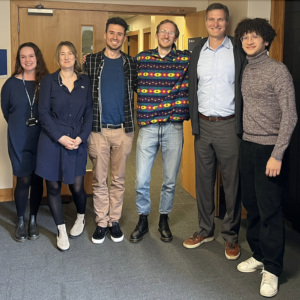
Abstract:
Disparities are present in virtually all aspects of public safety in the United States (Kovera, 2019) from exposure to neighborhood violence (Berg, 2014), and emergency response times and dispatch, to laws that harm communities of color at greater levels (Kerr, 2016). Researchers have well documented over-policing (Fagan, et al., 2016), disproportionate prosecution and conviction rates (Omori & Peterson, 2020), biased pretrial detention bail and bond levels (Aseefa, 2018; Woolredge et al., 2015) as well as sentencing disparities (Steinmetz & Henderson, 2016).
Policies that balance personal freedom and community safety for all members of society should arguably be a shared value in the U.S. The concrete expression of these values, particularly through policy change and implementation, presents an unresolved tension for policy makers and community members alike.
Understanding resistance to recent changes intended to increase equity, the constituencies in which it is concentrated, and the attitudes and factors which contribute to the resistance, may be helpful in learning more about the barriers to equity acceptance more broadly. Understanding such barriers, the constituencies in which they are concentrated and their etiology has the potential to lead to improved dialogue, development of outreach and education around shifting policy, and ultimately greater levels of legal and social equity.
Judah Viola, PhD will present the process and preliminary findings of a mixed quantitative and qualitative study of perceptions of recent public safety reforms. In particular, the study attempts to understand the psychological resistance to recent policy legislation. Understanding such barriers, the constituencies in which they are concentrated and their etiology has the potential to lead to improved dialogue, development of outreach and education, and ultimately greater levels of legal and social equity. The presentation and subsequent discussion will also cover how this applied community-based approach is similar to and distinct from more traditional research in social psychology.
Conference on the Consequences of Conspiracy Theories
We will be hosting this event on the 28th and 29th June 2024. All details can be found here.

CONSPIRACY_FX Writing Retreat 2023
In September 2023, we hosted our second residential workshop, which bought together staff and students from the CONSPIRACY_FX project, PSYPOL project, PolPsych_Kent lab and visitors from the Universities of Nottingham, Cambridge and the Université Libre de Bruxelles. We spent three days together in the beautiful Kent countryside to discuss our ongoing research, share ideas and receive feedback on our project.

Guest Speaker
On Thursday 14th September 2023, the CONSPIRACY_FX team hosted Dr Kenzo Nera, who gave a talk as part of our seminar series. Kenzo is a postdoctoral researcher at the Université Libre de Bruxelles, working with Professor Olivier Klein on the psychology of conspiracy theories.

The title of the talk was:
“They Want to Silence Us!” How Conspiracy Theory Believers Cope with Stigmatisation
Abstract:
Conspiracy theories have gathered unprecedented attention in recent years. Everyone has heard about “conspiracy theories” in the general public, and scientific research on the topic is growing exponentially. In addition, many initiatives are being developed to reduce the spread and appeal of conspiracy theories. However, “conspiracy theorists” tend to perceive criticisms of their beliefs as censorships of voices challenging powerholders – and therefore, as a confirmation of their worldview. As a result, conspiracy believers are susceptible to reclaim the label “conspiracy theorist” and rally around this derogatory label. In this presentation, I will present works on the intertwined relationships between conspiracy beliefs, perceptions that conspiracy theorists are discriminated against, and identification with (fellow) conspiracy believers.
CONSPIRACY_FX Writing Retreat 2022
The CONSPIRACY_FX team hosted our first residential team building and networking event in September 2022. We hired the amazing Zanzibar Hotel in St. Leonards and invited researchers from the University of Kent’s PSY-POL project and Political Psychology Lab, alongside academics from other institutions, to join us. We spent three days leading and being a part of scheduled discussions and research-orientated conversations, and gained important feedback on our research and writing in-progress. As you can see from the images below – the location was amazing. The event was extremely worthwhile, allowing all the researchers the space and time to reflect and write in an inspirational and supportive environment.
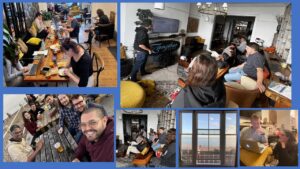
Twitter Q&A
On Thursday 14th July 2022, Post Doc Researcher Daniel Toribio-Florez took over the @CONSPIRACY_FX twitter feed to answer questions about #ConspiracyTheories.
Guest Speaker
Our first guest speaker Dr Daniel Jolley from the University of Nottingham, visited us on Thursday 28th April 2022 to deliver a talk entitled “Exploring and addressing intergroup conspiracy theories”. Daniel’s abstract is below.

Abstract:
Whilst many conspiracy theories are related to general beliefs about government, society or powerful people (e.g., the moon landing, climate change, COVID-19 pandemic), many other conspiracy theories have a clear intergroup context. In the psychological literature, findings such as a relationship between conspiracy beliefs and prejudice have been uncovered. However, less is understood about intergroup conspiracy theories’ broader impact and how such conspiracy beliefs can be reduced. In this talk, Dr Daniel Jolley will present new findings on the links between intergroup conspiracy beliefs and i) violent responses and ii) biased jury decision-making. In samples of Jewish participants, he will also show how perceiving conspiracy theories about their in-group as popular by outgroups can increase perceptions of threat and anger. With these consequences in mind, he will then discuss how intergroup contact can act as a tool to reduce conspiracy beliefs. Notably, he will show how the effect between contact and conspiracy beliefs are maintained even when controlling for prejudice, thus demonstrating another broad implication of intergroup contact.
